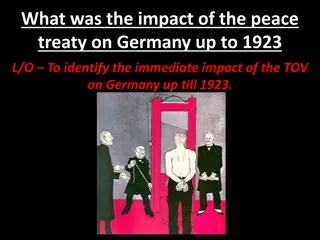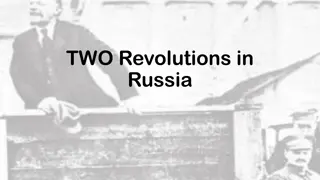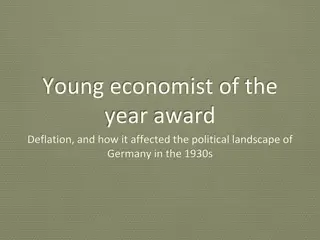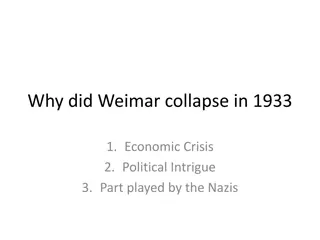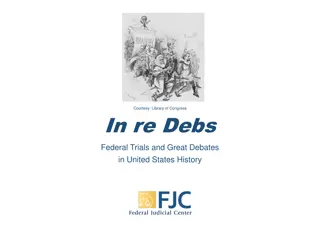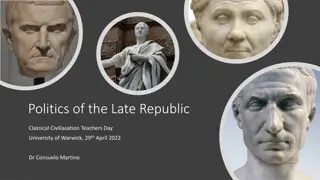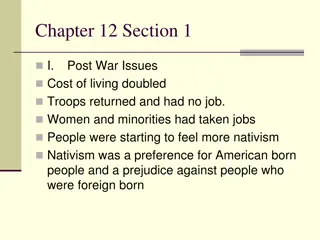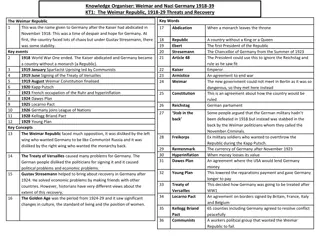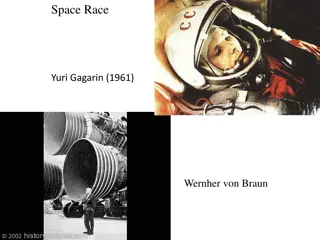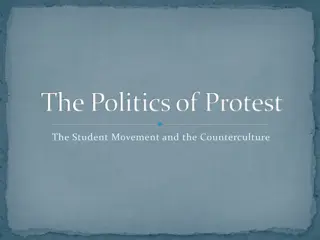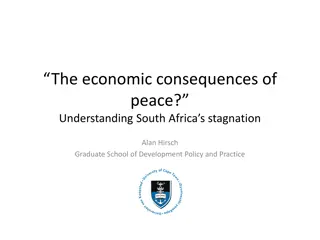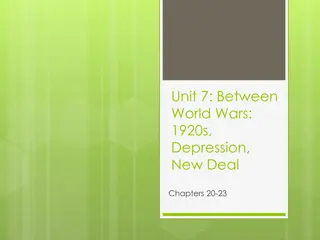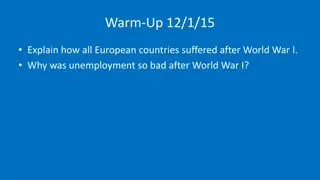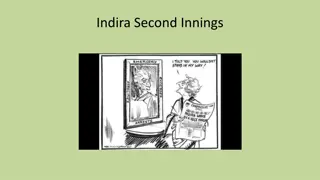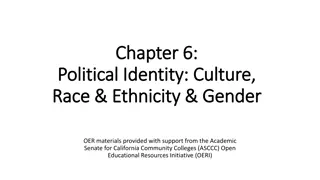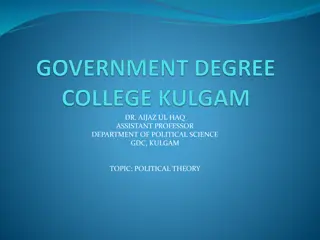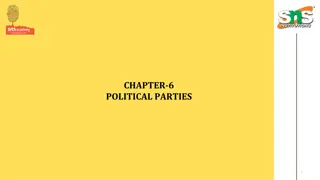AKBAR THE GREAT
After the death of Humayun, his young son Akbar assumed the Mughal throne with the guidance of Bairam Khan. Facing political unrest and enemies, Akbar's rule saw significant accomplishments, such as defeating Hemu at the Second Battle of Panipat and establishing a strong administrative system. His e
2 views • 31 slides
Unrest and Uncertainty: Post-Election Turmoil in Pakistan
The recent national elections in Pakistan have sparked controversy and unrest, with former prime ministers Imran Khan and Nawaz Sharif both claiming victory amidst allegations of voter fraud and political restrictions. The country faces economic challenges, internal insurgencies, and strained intern
8 views • 5 slides
Impact of Treaty of Versailles on Germany up to 1923
Germany faced immediate harsh consequences from the Treaty of Versailles, including huge reparations, loss of resource-rich lands, and political turmoil. The treaty led to economic bankruptcy, hyperinflation, and social unrest, with right-wing extremists attempting coups and assassinations. The occu
1 views • 8 slides
Interdisciplinary Approach in Political Science and Its Relation with History
The need for an interdisciplinary approach in political science emerged in the 20th century to study political issues from various social science perspectives. This approach emphasizes the interrelation between political science and other disciplines like history. History provides the foundation for
0 views • 23 slides
Institutionalism and Methodological Issues in Political Science
Institutionalism is a foundational concept in political science, emphasizing the study of governing institutions and their role in shaping political behavior. It explores inductive and deductive approaches to research, highlighting the significance of empirical evidence and theoretical assumptions.
0 views • 19 slides
Understanding Gramsci's Political Theory and its Relevance Today
Gramsci's political theory, focusing on concepts such as hegemony, historical bloc, and the role of intellectuals, offers valuable insights into contemporary political challenges. Explored through the lenses of Prof. Ken Spours and Stuart Hall's analytical tradition, this analysis sheds light on Con
0 views • 13 slides
Evolution of Citizenship in Liberal Democracy
Citizenship within liberal democracy entails equal rights, duties, liberties, and constraints for individuals within a political community. The entrenchment of civil and political rights has shaped the struggle for membership and participation in political communities. Civil rights, essential for in
1 views • 11 slides
The Famished Road by Ben Okri - A Tale of Spirits and Struggles
Set in an African village, Ben Okri's novel follows Azaro, a spirit child with powers to see the future. As he navigates his mystical abilities and encounters malevolent spirits, Azaro faces financial struggles and political unrest in his community.
0 views • 6 slides
Understanding Political Theory through a Contextual Approach
Exploring G.H. Sabine's perspective on political theory through a contextual approach, emphasizing the importance of historical context and societal influences. Sabine argues that while political theory evolves with its contemporary politics, it should be analyzed within its specific time and social
0 views • 9 slides
Two Revolutions in Russia: The March and November Revolutions of 1917
The year 1917 witnessed two significant revolutions in Russia - the March Revolution leading to the abdication of the Tsar and the formation of the Provisional Government, followed by the November Revolution where Lenin's Bolsheviks overthrew the Provisional Government and established the world's fi
0 views • 20 slides
Italian Military Policy and National Challenges: A Historical Analysis
The history of Italian military policy from 1860 to 1960 reveals a complex relationship between the army, state, and society. The military's role in defending new territories and maintaining internal order, along with its performance in battles such as Lissa and Custoza, reflects a transitional peri
0 views • 20 slides
Understanding Political Beliefs and Behaviors: A Comprehensive Overview
Explore the formation, evolution, and transmission of political beliefs, as well as the impact of differing beliefs and behaviors on the political process. Delve into platform issues, political affiliations, and their influences to gain a deeper understanding of the political landscape.
1 views • 53 slides
Understanding Nationalism in Political Science
Nationalism, a complex concept, defines the nation as the fundamental unit of political rule. It encompasses a mix of objective and subjective factors, including cultural, ethnic, and political traits. The definition of a nation is subjective, based on how its members perceive themselves as a distin
0 views • 27 slides
Economic Crisis and Political Turmoil in 1930s Germany
Deflation and the Great Depression had a profound impact on Germany in the 1930s, leading to widespread unemployment, economic turmoil, and political unrest. The Weimar Republic faced severe challenges as the Nazi party gained power amidst the economic crisis, exacerbated by the aftermath of World W
0 views • 16 slides
Factors Leading to the Collapse of the Weimar Republic in 1933
Economic crisis, political intrigue, and the rise of the Nazis were key factors in the collapse of the Weimar Republic in 1933. The Wall Street Crash of 1929 exacerbated Germany's economic problems, leading to massive unemployment and social unrest. Political errors and the erosion of democracy furt
0 views • 15 slides
Understanding Political Science: A Comprehensive Overview
The study of political science delves into various aspects, from the pursuit of the good society to the exercise of power and the allocation of resources. It encompasses specialized fields such as American politics, international relations, comparative politics, public policy, and political philosop
0 views • 5 slides
The Pullman Strike of 1894: Eugene Debs and Labor Unrest
The Pullman Strike of 1894 was a pivotal event in American labor history, led by Eugene Debs and the American Railway Union against the Pullman Company's unfair labor practices. Workers protested wage cuts and living conditions, sparking a nationwide strike that disrupted rail traffic. Despite facin
0 views • 18 slides
Political Unrest and Power Struggles in Ancient Rome
In the Late Republic of Rome, conflicts between the plebeians and the Senate often led to internal discord and power struggles. The tensions escalated over time, culminating in instances of armed strife and civil war. Leaders like Marcius Coriolanus and Tiberius Gracchus played significant roles in
0 views • 40 slides
Insights from the War of Spanish Succession (1702-1713)
The War of Spanish Succession (1702-1713) marked Louis XIV's final war, reflecting a complex political landscape in Europe. The conflict arose due to the declining power of Spain, with the last Hapsburg monarch, Charles II, facing challenges of inbreeding and mental deficiencies. The struggle for co
0 views • 20 slides
Political Development Theory and Practice: An Overview
Political development refers to the evolution of institutions forming the political power system of a society. Initially popular in the 60s-70s to describe political change, it later fell out of favor for being Euro-centric but has since regained significance. The concept encompasses aspects like po
0 views • 13 slides
Political Party Funding Act 2018 Overview
The Political Party Funding Act of 2018 in South Africa aims to enhance multi-party democracy by regulating the funding and donations to political parties. It establishes the Multi-Party Democracy Fund funded by private sources, alongside the existing Represented Political Party Fund. The Act prohib
0 views • 17 slides
Understanding Political Party Funding Act of 2018
The Political Party Funding Act of 2018 regulates the funding of political parties in South Africa, ensuring equitable and proportional funding for parties participating in national and provincial legislatures. The Act defines various terms such as donations, foreign persons, and political parties,
0 views • 42 slides
American Colonial Unrest and Revolutionary Actions
American colonies faced a series of challenges and oppressive acts from the British government, triggering unrest and paving the way for revolutionary actions. This period saw events such as the Proclamation Line of 1763, Quartering Act, Stamp Act tax, and the formation of groups like the Sons of Li
0 views • 15 slides
Post-War Issues: Nativism, Red Scare, and Labor Unrest in the 1920s
The 1920s saw a rise in nativism, with Americans feeling threatened by job competition from women and minorities. The era was marked by the Red Scare, fueled by fears of communism spreading globally, leading to the formation of the Ku Klux Klan. The Quota System was implemented to limit immigration,
0 views • 7 slides
Weimar and Nazi Germany: A Historical Overview
Germany's tumultuous period from the Weimar Republic to the rise of Hitler's Nazi Party is marked by economic challenges, political unrest, and social transformation. The Weimar Republic faced threats and sought recovery, while Hitler capitalized on the weaknesses of the system to ascend to power in
0 views • 4 slides
Cold War and the Vietnam Conflict: A Historical Overview
Explore the tumultuous era of the Cold War and the Vietnam Conflict, including key events like the Cuban Missile Crisis, the Gulf of Tonkin incident, and the Tet Offensive. Discover how Cold War tensions shaped US military strategy and the struggles faced in Vietnam, from political unrest to militar
0 views • 18 slides
The Politics of Protest: The Student Movement and the Counterculture
The 1960s witnessed the rise of the youth movement and counterculture in the United States. Inspired by social and political unrest, students formed organizations like the Students for a Democratic Society and engaged in protests such as the Free Speech Movement and the Columbia University occupatio
0 views • 14 slides
Evolution of Political Ideas and Influences on American Founding
In the history of politics, major ideas like laws of nature, unalienable rights, divine right of kings, social contract theory, and rights of resistance have influenced the American founding. Various traditions such as Judeo-Christian, English common law, Enlightenment, and republicanism played a si
0 views • 68 slides
Economic Stagnation in South Africa Post-Peace Settlement
South Africa's slow economic growth compared to its peers is attributed to a moribund economy with weak exports, low investment, poor innovation, and limited competition. The 1994 political settlement, while miraculous, hindered necessary transformations to address inequality and foster growth, lead
0 views • 35 slides
Between World Wars: 1920s, Depression, New Deal Recap
Exploring the turbulent era between the World Wars, this recap covers the societal shifts of the Roaring 20s, Red Scare fears, new media outlets, causes of the Great Depression, and its impactful aftermath including unemployment, financial collapse, and political unrest.
0 views • 10 slides
The Impact of World War I on European Countries and Global Unemployment
European countries faced significant challenges after World War I, with war debts, high unemployment rates, and economic instability. The worldwide depression further worsened the situation, leading to inflation and a weakened industry. This turmoil gave rise to social unrest and nationalism, highli
1 views • 6 slides
Political Turmoil in 1980s India
The political landscape in 1980s India was marked by significant events such as the rise of communal tensions in Kashmir, the emergence of Sikh separatism in Punjab, and the assassination of Prime Minister Indira Gandhi. These events led to a period of turmoil, including Operation Blue Star and anti
0 views • 15 slides
Causes of the French Revolution and Economic Factors Leading to Unrest
The French Revolution was fueled by a combination of political, social, and economic factors. Political causes included royal incompetence, denial of voice in government, and unpopular monarchs like King Louis XVI and Marie Antoinette. Social causes stemmed from the vast inequality among the three e
0 views • 14 slides
Explore the Fascinating World of Political Science
The Department of Political Science offers a range of courses, delving into topics such as political theory, international relations, and governance. Understand the distinction between politicians and political scientists, and explore branches of political science like public administration and huma
0 views • 16 slides
Understanding Political Identity: Culture, Race & Gender in Society
Explore the intricate aspects of political identity, culture, race, ethnicity, and gender in society. Discover how individuals shape their identities and the impact of political mobilization on society. Uncover the significance of political socialization and the role of societal institutions in shap
0 views • 20 slides
Evolution of Political Protests in Modern Russia: A Historical Overview
This article provides an in-depth analysis of the evolution of political protests in modern Russia from 1990 to present. It discusses the attitude of Russian journalists towards protests, basic concepts of political protest in modern political science, myths surrounding protests in Russia, and the f
0 views • 24 slides
Impact of Political Stability on Equity Trading Costs of Cross-Listed Firms
The research explores the relationship between political stability and equity trading costs of cross-listed firms, highlighting the impact of political institutions, liquidity, and investor protection. It delves into the importance of factors like quality of political institutions, transparency, and
0 views • 24 slides
Interdisciplinary Relationships in Political Science
Political science and history share a symbiotic relationship, with history providing the foundation for political analysis while political science influences historical events. The contribution of economics to political science is evident in how economic conditions shape political ideologies and pol
0 views • 12 slides
Understanding Political Theory: Definitions, Differences, and Significance
Political theory encompasses systematic explanations of political phenomena, distinct from political thought which involves ideas and opinions of philosophers. It constitutes both political science and philosophy, addressing both empirical and evaluative aspects. The significance lies in finding sol
0 views • 7 slides
Remedial Measures Implemented by Indian Political Party
Explore the impactful remedial measures taken by a prominent political party in India through a collage presentation. Delve into the functions of political parties, understanding partisanship, the necessity of political parties, and more. Gain insights into the significance and role of political par
0 views • 23 slides


